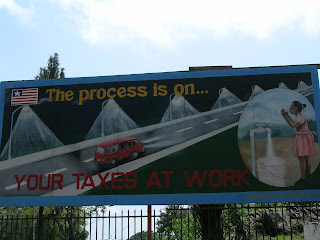All of the progress that we’ve made can be attributed to the fact that we’ve got strong women leadership in the government, these are all strong women that have led the processes of change and renewal. With all the problems and all the scares, I remain optimistic that Liberia will rise again."
—Ellen Johnson Sirleaf
She sat down on her favourite rocking chair, looked around at all of us, and smiled. Ellen Johnson Sirleaf might be the first elected woman president of Africa, but her sincerity and frankness made the occasion seem less like a formal meeting with a head of state, and more like a grandmother summoning her grandchildren around her feet to talk at the end of the day.
It has been a long day for her – in fact, every day as the President of Liberia must be a long day. Since her inauguration in 2006, President Sirleaf and her administration has laboured tirelessly to prevent a post-conflict nation from returning to civil war. Between the endless meetings with various ministries and international organizations, where she fire-fights urgent concerns and strategizes on the long-term development of the country, President Sirleaf also rushes around the country to communicate with the general public face-to-face, to listen to their concerns and to deliver them the personal message that the government is doing all they can do get Liberia back on its feet. So much of the hopes and expectations of both the Liberian people and the international community rests on this one lady’s shoulders, that it is unimaginable what the country would be like without her.
Fighting alongside President Sirleaf are the other Iron Ladies of Liberia, who have been personally appointed to leadership positions by the President. The Ministry of Finance where I work is headed by Dr Antoinette Sayeh, a brilliant lady who has been instrumental in pulling the country out of its crippling debt situation. The Ministers of Justice, Gender, Commerce, Youth and Sports are other examples of powerful ladies who are helping to change the face of Liberia.
The Ministry of Finance interns with Dr Antoinette Sayeh, Minister of Finance
It has been an inspiration and privilege to witness the changes and progress these Iron Ladies have made. However, as I look around the streets on my way to work and see the numerous women struggling to make a living in the sun and in the rain day after day, and as I hear and read about their sufferings during the long years of war, I begin to realize the enormity of the challenges faced by the Sirleaf administration as it tries to reintegrate these women back into society.
Ellen Johnson Sirleaf gets up from her rocking chair and bids us farewell. For us, the day is over and we will return from the President’s house back to our apartments, chat about our meeting with her, and go off to bed. For President Sirleaf however, the night is still young. She walks off to her next meeting as if it were the beginning of a new day.

The MPA/IDs with Ellen Johnson Sirleaf, President of Liberia







